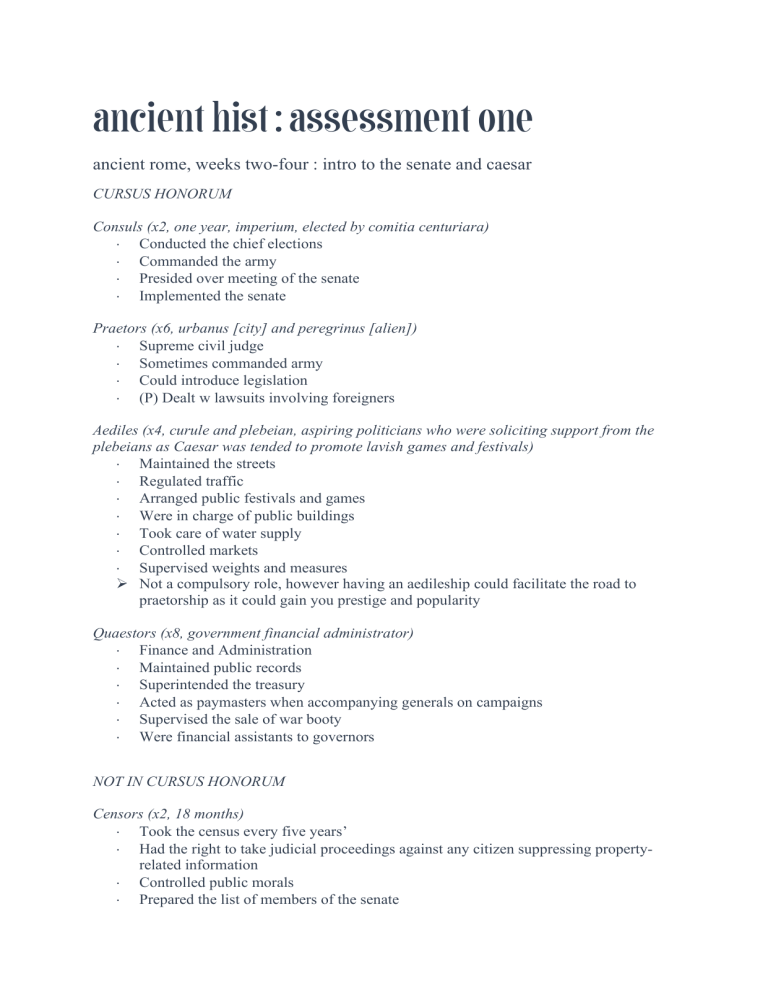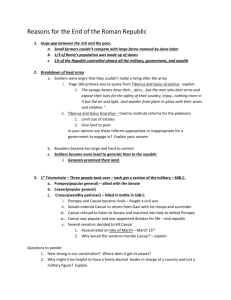
ancient hist : assessment one ancient rome, weeks two-four : intro to the senate and caesar CURSUS HONORUM Consuls (x2, one year, imperium, elected by comitia centuriara) Conducted the chief elections Commanded the army Presided over meeting of the senate Implemented the senate Praetors (x6, urbanus [city] and peregrinus [alien]) Supreme civil judge Sometimes commanded army Could introduce legislation (P) Dealt w lawsuits involving foreigners Aediles (x4, curule and plebeian, aspiring politicians who were soliciting support from the plebeians as Caesar was tended to promote lavish games and festivals) Maintained the streets Regulated traffic Arranged public festivals and games Were in charge of public buildings Took care of water supply Controlled markets Supervised weights and measures ➢ Not a compulsory role, however having an aedileship could facilitate the road to praetorship as it could gain you prestige and popularity Quaestors (x8, government financial administrator) Finance and Administration Maintained public records Superintended the treasury Acted as paymasters when accompanying generals on campaigns Supervised the sale of war booty Were financial assistants to governors NOT IN CURSUS HONORUM Censors (x2, 18 months) Took the census every five years’ Had the right to take judicial proceedings against any citizen suppressing propertyrelated information Controlled public morals Prepared the list of members of the senate Supervised the leasing of public lands, buildings, and letting go of government contacts Dictators (x1, six months in a crisis) Superseded all other magistrates in a military or serious domestic emergency So in essence power to overrule every single person in the whole of the empire, when the consuls realise that they cannot resolve an issue Tribunes (x10, have tribunoia sacrosanctity – very important to safeguard them) Defended the lives and property of the plebeians Summoned the plebeian assembly and gained resolutions from it Veto power! o Elections of magistrates o Laws and decrees of the Senate o Actions of magistrates o Actions of any of his nine colleagues Roles of the Senate (Senatus Populusque Romanus Controlled expenditure from the treasury Directed priesthoods Allocated funds for public buildings Appointed provincial governors Sent and received embassies Advised magistrates Dealt w crises to the state Power! Imperium : supreme authority, including command in war, death penalty, interpretation of the law Potestas : the power of a magistrate to enforce the law Assemblies (bodies comprised of Roman citizens) Elected consuls Voted on proposals Could not raise or discuss any issues PATRON CLIENT Duties Follow their patron into war Vote for their patron in elections Give respectful attention to the patron To support the patron in certain economic matters such as helping to provide a dowry for the patron’s daughter Benefits Received land to farm Received legal help and protection in the courts Received food rations or occasional payments in cash as relief Mutual Patrons and clients could not provide evidence against one another FIRST TRIUMVIRATE What is modernly known as the ‘First Triumvirate’ was in fact an agreement between Pompey, Crassus and Caesar to work together for their own ends; an unofficial alliance. Caesar appealed for the three of them to work together, and despite Pompey and Crassus’ uneasy terms, it was accepted. Between them, the three men had a decent degree of power; they had prestige, wealth, popularity of the people, and the support of the equites and armed force if necessary (veterans). Triumvirate: an informal alliance of three people who want something and thus opt to work together. Optimates: conservative party. Populares: relied on mass support. Pompey (Pomperus), Gnaeus Was a general in the war in asia Wanted: optimate support, his eastern settlement ratified by the senate, and to settle his veterans His opposition included Cato, Lucullus, and Metellus Had lost his prestige as his optimates rejected him Had carried out a successful military expedition in the east and returned to Italy in 62 BCE, and he wanted to settle his soldiers on land grants but the Senate refused to allow this Crassus, Marcus Spokesperson for equites (the middle class tradespeople who dealt with international commerce) Equites requested a tax rebate for their interests in Asia Caesar, Gaius Julius Hoped for the consulship of 59 Wanted: to be consul, to have prestige (dignitas: dignity w influence, and gravitas: to have a centeredness and solidity that was respected by people) Optimates were trying to block Caesar Common Ground Conflict with the optimates End goal was to get Caesar elected to consul o When he was, Pompey and Crassus would have Caesar in power to introduce legislation for them o Caesar would have a more successful campaign and get more votes because of Crassus’ money and clients, and Pompey’s popularity Needs for the Triumvirate [ reinforcing learning ] Caesar: consulship of 59, and also a province for 58 for his military ability; power; respect; dignitas Crassus: a rebate for the equestrian tax farmers who were his clients as their tax collection was interrupted by conflict [ the conflict in Asia? ] Pompey: land for his veterans, the eastern settlement ratified ‘en bloc’ CAESAR’S FIRST CONSULSHIP OF 59 Caesar, the popularis, was elected w the individual backing of Pompey and Crassus. Opposition to his legislation The hostile senate and optimates His co-consul being Bibulus (who is married to Cato’s daughter), meaning he was supposed to check up on his actions Cato [ peak optimates Caesar hater ] would obviously continue to oppose him In essence, the lex agraria, one of his first bits of legislation, was struggling to get passed through the Senate; he was met w prolonged and systematic obstruction He thus presented this land bill to the assembly, however Bibulus vetoed it and would not withdraw his veto despite Caesar’s requests Lex Agraria A moderate bill for Pompey’s veterans was presented to the Senate Caesar indicated that he was willing to accept amendments if the objections were reasonable, however the senate spurned his offer of compromise and provided all that opposition mentioned above Caesar then realized that he would only be able to carry the bill in open defiance of the law, having to resort to the threat of force o Caesar called upon Pompey and Crassus who had remained in the background, to express their approval and publicly support the bill o Pompey was not too thrilled at this, but did almost begrudgingly, as Caesar brought him out openly in front of the masses and asked him of his opinion, and Pompey said he did approve the new laws o The threat of force was a very strong factor in preventing the triumvirs’ opponents from resorting to violence themselves o When faced with the threat of force and violence by the triumvirs, Bibulus came to the realization that he could not prevent the agrarian law from being passed by any other normal methods • Thus proclaimed that the remaining days of the year were to be regarded a ‘sacred period’ • Meaning it was legally impossible for the people to even meet in an assembly, and rendering Caesar’s legislation technically illegal, but nevertheless he went through w it and declared that the bill had passed o Bibulus, meanwhile, withdrew to his house for the remainder of the term of office, and declared that he would be watching the sky for unfavorable omens (taking the auspices), which left Caesar to govern alone Lex Campania Provided for the last public lands in Italy that were being farmed by the optimates, to be divided into 20,000 allotments and distributed predominantly to the urban poor. Further Legislation Vatinius, tribune, was Caesar’s method of honoring the rest of his promises to Pomeoy and Crassus Pompey’s eastern settlement was ratified en bloc Equestrians received a rebate of one-third of their tax rebate Vatinius also proposed to the assembly that Caesar be given Cisalpine Gaul and Illycrium as his province for the following year, w imperium for five years, and an army of three legions, in order to replace Caesar’s previous province, which was to be the silvae callesque (nominated as the province for the consuls of 59) o Caesar could now raise an army and keep it near Rome o The death of the governor of Transalpine Gaul also led to that vital part of Gaul to Caesar’s province CAESAR’S RISE TO POWER Earlier Life Caesar refused to divorce his wife, leaving Sulla quite angry, meaning that he was stripped of his priesthood (he was nominated to be the next flamen of Jupiter), wife’s dowry, and inheritance He went into hiding, and eventually received a pardon from the Vestal Virgins First military service occurred in Asia, resulting in him receiving the civic crown for gallantry which adds towards improving his reputation Tribune Returned to Rome after Sulla’s death, for a short time during which he is voted by the people to the rank of military tribune where he did more to gain the favor of the Romans Returned the tribunes of the people and supported a bill to recall his brother-in-law from exile, and prosecuting a number of notable people in the courts By 69, he was eligible to stand for quaestorship, and for the next ten years his career followed the standard pattern of the cursus honorum Quaestor Was appointed to Further Spain by the praetorian government for an assize circuit Made customary funeral speech when his aunt died and used occasion of public funeral to express his anti-conservative attitude Came to an end following a dismal dream of him assaulting his own mother and interprets it as a symbol of his destiny to be a great conqueror of the earth Aedileship Caesar concerns himself with grand displays and embellishments, exhibiting materials in the Comitium, the Forum, adjacent Basilicas, and the Capitol itself Entertaining and amusing the people with as wild-beast hunts and stage plays, and also added a fight of gladiators to the other spectacles exhibited to the people } to conciliate popular favour ; won great popularity as a result of the lavish public games he presented He endeavored to be put in charge of Egypt as his province Stoodd for pontifex maximus and secured it through means of flagrant bribery, beating two other older opponents Praetorship Elected praetor for the year in 62 BCE, while still being pontifex maximus Divorced his wife Pompeia because of Clodius’ cross-dressing prank pulled at the very sacred Bona Dea held typically in the house of the Pontifex Maximus Appointed governor of Further Spain Did lots of things that put him at odds with the Senate during his praetorship, such as trying to take someone’s commission, and championing some legislation (was told that he would have to leave and thus retired) but the people went to his house and begged him to come back Pro-praetorship : (an officer, esp an ex-praetor, who was sent to govern a province w praetorial authority) Was appointed to Further Spain (again?) to pacify a revolt Was heavy w debt, through warfare and subsequent booty in Spain he cleared his debts and won a triumph for his success against the independent Spanish tribes Won and hurried back to try and claim a military triumph and stand for consul, but he had to forgo the triumph to stand for consul Consulship Elected consul despite every effort by the Senate to prevent it Arranged the triumvirate with his boys Crassus (rich friend) and Pompey (old political ally)


